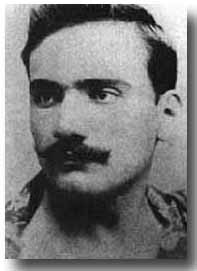The Tenor's Trembling Hand
By Orlando R. Barone
A young and nervous Roberto Alagna once missed a high note in La Boheme. La speranza is dashed at his big time debut. In the tradition of historic hysterics over sore throats, colds, and flu infecting operatic performances, he joined the best of them in absorbing the slings, arrows, and Kleenexes of a stressed out bevy of operagoers intermittently alarmed, concerned, and just plain ticked off at the inevitable sub-standard performance of a 24-hour-virus-stricken divo gamely attempting the fulfillment of his impossibly demanding responsibilities to an often bloodless and bloodthirsty public.

That young man was likely thankful it is happened early in his career, although it did put the crimps on his presumptive triumph. Caruso, you know, was castigated for his infrequent cancellations in his era of never-to-be-matched hardships in international travel. Wherever he toured, hands on hips harumphs met his absolutely reasonable demands for clean sheets, pillows, and other steps to provide him some advantage against the infinitely creative microbes whose sole earthly purpose is to humiliate tenors. Of course, the same public was aghast when Caruso, on 11 December 1920, upon the stage of the Brooklyn Academy of Music, began his much admired impersonation of Nemorino. His young wife, seated in the first row, knew he had earlier been bleeding from the mouth. Now she blinked in horror as a red stain formed and spread along the fabric of his peasant's smock. She gasped when her husband turned around, pulled a handkerchief from his pocket and coughed rackingly into it, filling it rapidly with blood.
The performance never flagged, as Caruso edged repeatedly to the wings to retrieve any clean cloth his secretary, Bruno Zirato, could find and pass to the man whose singing was said to be excellent except for those moments when the hemorrhaging threatened to drown him. He finished the act and accepted a suspension of the performance only after impresario Gatti insisted.
Caruso was of course a driven man probably seeking to ward off his impending death by sheer willpower. But we the audience are not blameless in our complex relationship with our paragons, those whose superlative talent rouses in us such an odd mix of admiration, jealousy, joy, impatience, worship, contempt, love, and, yes, hate. Review the varigated commentary on the likes of Callas, Pavarotti, Toscannini, and read for yourself!
What are we about, we, the audience? We are one moment fawning and violently boisterous in our acclamations of wondering praise, the next moment haughty and viciously derisive in our expressions of raging disappointment.
I think perhaps we identify with the great ones; it's a piece of us up there slamming that High C and holding it for seven or eight seconds. When the artists climb to their personal peak, we swoon with ecstasy, easily imagining their best to be ours, somehow. When they falter or decline, the mirror mirror on the wall reveals our own Dorian Gray, and we respond with horrified rage at our private unmasking. We see ourselves, less than heroic, less than superlative, perhaps just mediocre. We are the dress circle phantoms of the opera, doomed to wander offstage out of the range of greatness.
What is it about opera that brings about this excess of ecstasy, this outpouring of outrage? It has something to do with the voice, with talent, with power, with art, with work, with risk, with fear, and, finally, with a singular stroke of courage, not unlike insanity.
Opera, all of it, begins in the musical mind of genius, a Wagner, Verdi, Puccini. They engender the goal, envision the perfect blend of story and song, whose first creation is words and music, stains on paper, alive only in the imagination of one brilliant being.
There are the ancillaries-stage, costume, lighting, chorus, orchestra, and of course we who watch and listen and respond.
Ultimately, supremely, there is voice. Two tiny curtains of tense tissue vibrating through the performers personal resonance chambers and out toward thousands of ears attuned to some notion of perfection and measuring each echo against that notion. La speranza: that the tenor will make the miracle happen.
While yet a boy, Enrico Caruso's elder son watched the father he thought a god don the clown's smock in I Pagliacci. What the lad noted was not the singing, not the garish joker face in farina. No, what he noticed was his father's hand, gripping the stick he would use to beat the absurdly large drum before him.
The hand was shaking with terror. The god trembled before those thousands of ears. No human on earth, thought the stricken son, should be put through such a horrible ordeal night after night.
The hand of the titanic tenor trembles. We, the phantoms of the opera, await the echo of greatness, the song of the peasant, the bohemian, the clown. "To go on when my mind reels in delirium, not knowing what I am saying or doing."
"Yet I must force myself. I must."
________________________________________________________________________________________
This article, orignally written in 1996, is reprinted from jcarreras.com
This page was last updated on: January 4, 2004